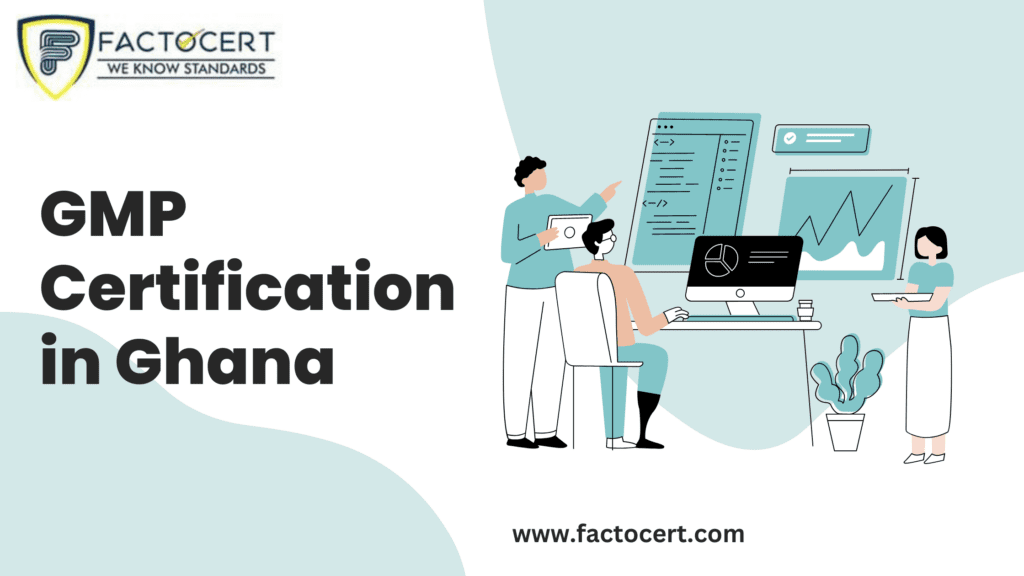GMP Certification in Ghana Ensuring that Products are safe and of good quality is vital in the pharmacy and healthcare industries. Getting Good Manufacturing Practice (GMP) Certification is essential because it shows that a company is dedicated to making safe, high-quality medicines. Pharmaceutical companies in Ghana that want GMP Certification need to know about the vital papers required to speed up the process. We will help you get GMP Certification in Ghana by walking you through all the steps and papers you must follow.
Understanding GMP Certification:
Good Manufacturing Practice, or GMP, is a set of rules that ensure that companies that make medicines meet specific quality standards while making them. GMP Certification is an official seal of Certification from government agencies that a company follows these strict rules. In Ghana, getting GMP Certification means that the manufacturing methods, quality control measures, and ways of keeping records are carefully examined.
Essential Documents for GMP Certification in Ghana:
- Quality Guide: The quality guidebook is an important document that shows the pharmaceutical company’s dedication to following GMP guidelines. It should outline the quality management system, the company’s quality strategy, and the organisation of the business.
- Standard Operating Procedures (SOPs): SOPs explain in detail how to make different kinds of medicines, check their quality, and do other essential parts of the pharmaceutical production process. These papers should be complete, easy to understand, and available to everyone who needs them.
- Master Batch Records: These records have thorough directions on how to make each batch of medicinal goods. The raw materials, tools, steps in the process, and quality control checks should all be written down in these records.
- Validation Protocols and Reports: An essential part of GMP compliance is validation. Manufacturers must give evaluation procedures and reports for crucial systems, methods, and tools. This includes ensuring that making things, cleaning them, and doing analyses are correct.
- Change Control Procedures: These explain how to handle and ensure acceptable changes to systems, tools, or processes. This ensures that any changes are suitable for the quality and safety of the goods.
- Document Control System: You need a robust document control system to track and organise all GMP-related papers. This includes version control, document review methods, and a well-organised filing system.
- Training Records: Following GMPs requires staff who are well-trained. Keep detailed records of all your workers’ training programs, including those connected to GMP practices.
- Documentation for Quality Risk Management (QRM): This describes the steps taken to find, evaluate, and lower the risks to product quality. This includes looking at the dangers of the production method, the raw materials, and the sources.
- Procedures for Handling concerns: There must be a written process for dealing with customer concerns. This should include looking into issues, taking appropriate action, and stopping the problem from happening again.
- Audit Reports: Both internal and external audit reports show you are dedicated to always getting better and following the rules. These papers should include what was found, what was done to fix it, and plans for future growth.
- Records of Supplier Qualification and Evaluation: Keeping records of how sellers were qualified and evaluated is vital. This includes reviews of providers of raw materials, contract makers, and other outside partners.
- Records of Environmental Monitoring: These are important for clean medicinal goods. These records show that the setting was controlled and watched over while the product was being made.
How to Get GMP Certification in Ghana:
Pre-Assessment:
Do pre-assess your building and processes before officially asking for GMP Certification. Find any gaps in compliance and fill them in to improve your chances of getting certified.
Official Application: Send an official application for GMP Certification to the Ghanai regulatory body in charge of that area. Make sure that the application has all of the necessary papers.
Review of papers: The regulatory body will carefully review the documents sent in. This could include visits and talks with influential people who work there.
Inspection and Audit: An on-site inspection and audit will be done to check how well GMP practices are being used. Be ready to show that you followed the instructions in the papers you sent.
Corrective Actions: If any violations are found during the check, they will need to be fixed. These steps should be written down and taken right away.
Certification: GMP Certification will be given to the building once the legal body is happy with its compliance. This licence shows that the factory meets the quality standards that were set.
Why choose Factocert for GMP Certification in Ghana?
Are you seeking GMP Certification in Ghana? Factocert is a significant GMP Certification Bodies in Ghana, providing GMP Consultants in Ghana and with offices in Accra, Kumasi, Tema, Tamale, Cape Coast, and other important cities. We provide a variety of ISO Standards at discounted prices, including ISO 27001, ISO 9001, GDP, GLP,GMP, SA 8000 Halal, ISO 17025, ISO 14001, ISO 22000, and others. For further information, please visit www.factocert.com or contact us at contact@factocert.com
Conclusion
Pharmaceutical companies in Ghana have reached a big goal by getting GMP Certification. This shows that they are dedicated to making safe, high-quality goods. Companies can speed up their path to GMP compliance by learning about the necessary papers and following the Certification process. Remember that GMP is not a one-time thing but a pledge to uphold and raise quality standards in the pharmaceutical production process. Keep yourself up to date, follow the rules, and help the Ghanai healthcare business keep getting better.
For More information visit : GMP Certification in Ghana





